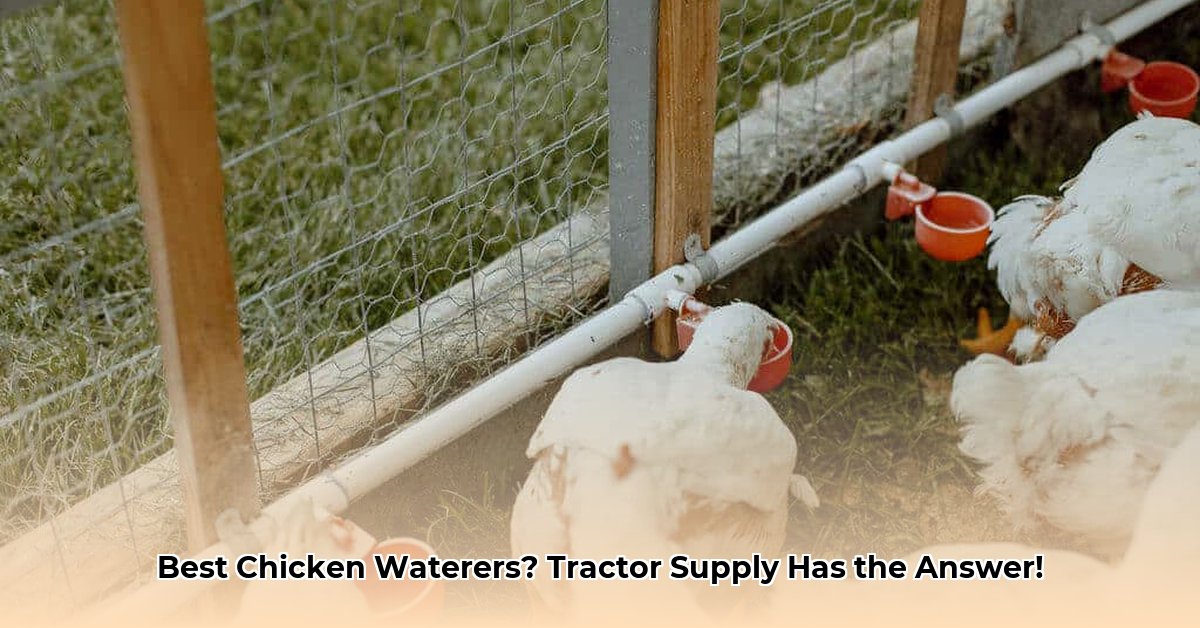
Keeping your chickens hydrated is crucial for their health and productivity. This guide helps you select the ideal chicken waterer from Tractor Supply, balancing cost, efficiency, and ease of maintenance. We'll compare different types, offer installation tips, and highlight sustainable practices for optimal flock health.
Choosing the Right Chicken Waterer: A Comprehensive Guide
Selecting a chicken waterer involves several key considerations. The right choice depends on your flock size, chicken age, climate, budget, and the time you can dedicate to cleaning. Let's explore the popular options available at Tractor Supply.
Types of Chicken Waterers: A Detailed Comparison
Tractor Supply offers a range of chicken waterers, each with unique advantages and disadvantages. Understanding these differences is key to making an informed decision.
Nipple Drinkers: These systems deliver water when a chicken pecks a nipple. They are highly efficient, minimizing water waste and spillage. However, young chicks might need time to learn how to use them, and they can be prone to freezing in cold weather. Regular cleaning is necessary to prevent clogs. (Excellent for larger flocks, prioritizing water conservation and hygiene.)
Cup Drinkers: Simple and inexpensive, these are ideal for smaller flocks and young chicks. Easy to clean and maintain, their open design, however, makes them more susceptible to contamination and spillage. (Best for smaller flocks or as supplementary water sources).
Bell Drinkers: A hybrid option, bell drinkers offer improved spill resistance compared to cup drinkers while remaining relatively inexpensive and easy to clean. They're a good middle ground for many flocks, balancing cost and efficiency. (Ideal for medium-sized flocks seeking a balance between simplicity and hygiene)
Trough Waterers: The simplest and least expensive option, trough waterers are open containers of water. While easy to fill, they are highly inefficient, prone to contamination, and waste significant amounts of water. (Suitable only for very young chicks or as supplementary water in specific situations).
Comparative Analysis: Key Features of Chicken Waterers
Let's summarize the key features of each type to assist your decision-making process. Remember, the best waterer depends on your specific circumstances. Do you prioritize water conservation, ease of cleaning, or affordability?
| Waterer Type | Initial Cost | Maintenance | Water Efficiency | Chick Suitability | Cleaning Ease | Durability |
|---|---|---|---|---|---|---|
| Nipple Drinker | High | Moderate | High | Low | Moderate | High |
| Cup Drinker | Low | Low | Low | High | High | Moderate |
| Bell Drinker | Moderate | Low | Moderate | Moderate | High | Moderate |
| Trough Waterer | Very Low | Very Low | Very Low | High | Easy | Low |
Rhetorical Question: Considering the trade-offs between initial cost and long-term maintenance, which waterer type offers the best return on investment for your flock size and climate?
Selecting the Best System for Your Needs: A Step-by-Step Guide
- Assess your flock size: Larger flocks need higher-capacity waterers.
- Consider your climate: Cold climates require frost-resistant or heated waterers.
- Determine your budget: Balance upfront costs with long-term savings on water and maintenance.
- Evaluate maintenance requirements: Choose a system that aligns with your available time commitment for cleaning.
- Prioritize sustainability: Opt for durable, water-efficient systems to reduce waste.
Quantifiable Fact: Studies show that nipple drinkers can reduce water consumption by up to 50% compared to open trough systems.
Installation and Maintenance: Ensuring Optimal Performance
- Site Selection: Choose a well-drained, shaded location, away from droppings.
- Secure Mounting: Follow manufacturer instructions for secure installation to prevent spills.
- Regular Cleaning: Clean and disinfect the waterer regularly (at least weekly) using a diluted bleach solution (follow safety instructions carefully).
- Water Level Monitoring: Maintain consistent water levels.
- Leak and Clog Checks: Regularly inspect for leaks and clogs, addressing them promptly.
Expert Quote: "Regular cleaning is paramount in preventing the spread of disease within your flock," says Dr. Emily Carter, Avian Veterinarian at the University of Agricultural Sciences.
Sustainable Farming Practices: Water Conservation and Hygiene
By choosing a water-efficient waterer and practicing diligent cleaning, you contribute to sustainable farming practices, reducing water waste and minimizing disease risks. This directly translates to healthier birds and a more efficient operation.
Call to Action: Visit your local Tractor Supply store or their website ([¹] https://www.tractorsupply.com/) to browse their extensive range of chicken waterers and find the perfect solution for your flock's needs.